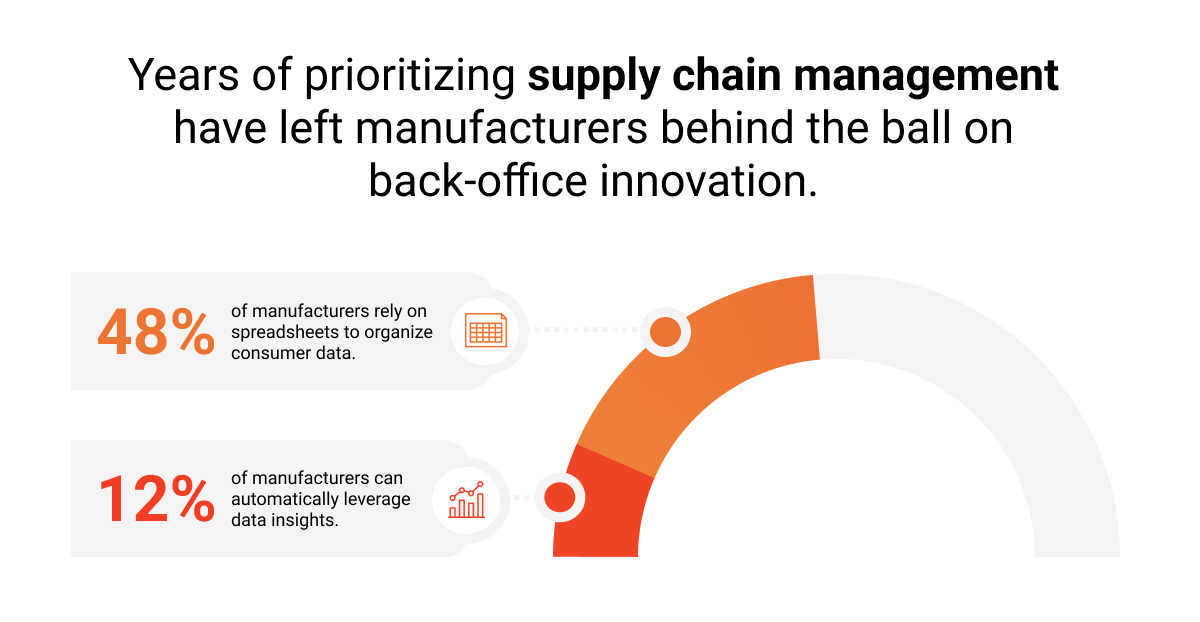Why Manufacturing Cloud?
Thanks to widespread market disruption, digital innovation has become a significant priority for manufacturing organizations. A McKinsey survey shows that manufacturers have flocked to innovative technology as a potential solution for common manufacturing pain points such as supply chain resilience (93%), material shortages (45%), sudden steep drops in demand (41%), and worker shortages (30%).
But without some sort of centralized framework in place, these innovative technologies function more like band-aids – when what is needed is actually surgery. Manufacturers in this position still have limited market visibility and are unable to track current demand or respond agilely to sudden shifts.

Manufacturers know a more significant change is needed; but how can they make that change in an efficient, cost-effective, and future-proof manner?
If you’re reading this, you’re thinking about Manufacturing Cloud as a potential solution. And it’s no wonder: with Salesforce being ranked the number one solution provider for the 10th year in a row, it stands to reason that Salesforce Manufacturing solutions are top-of-the-market. But what is Salesforce Manufacturing Cloud, and how does it actually provide concrete value-add for your business?
What is Manufacturing Cloud? How Does it Work?
Manufacturing Cloud: A digital customer engagement platform that refines and improves front-end and back-office processes for manufacturers. Time-tested and continually refined by Salesforce, Manufacturing Cloud’s built-in toolset is explicitly designed to address common pain points in the manufacturing industry.
For manufacturers struggling with the above pain points, Manufacturing Cloud can provide much-needed resolution.
Uniting all sources of information across the company to craft a reliable single source of truth, the solution breaks down barriers to communication and paves the way for efficient operations. The industry-specific solution’s unique toolset also unlocks a wide variety of much-needed process refinements, unlocking market visibility, accurate repricing, and white-glove customer service experiences.
Once equipped with Salesforce, manufacturers can:
- Capture a real-time view of product demand and adjust production volume accordingly
- Keep track of current and future opportunities for their products, allowing manufacturers to maximize ROI
- Respond agilely to shifts in product pricing, generating accurate predictions of potential expenses
- Foster brand-unique, omnichannel experiences on the customer side – a vital, high-demand feature in today’s market
- Automate customer support practices, allowing a quick resolution of complaints, product issues, and other consumer concerns
Thus empowered, businesses can deliver stellar customer experiences, leverage market insights to generate accurate predictions and get long-term value from their investments.
Take a look at the use case below to see Manufacturing Cloud in action!

Tailoring Salesforce to Your Needs: Building a Technology Stack
Salesforce’s Manufacturing solution improves an array of problem areas for industry players— and when implemented in tandem with other solutions, the value continues to build.
Adding to Manufacturing Cloud: A Salesforce technology stack
- Sales Cloud: A component that supports sales forces with automation. Sales Cloud facilitates lead management, accurate forecasting, and workflow automation.
- Service Cloud: A component that allows businesses to improve service experiences. Service Cloud adds omnichannel functionality, case management capabilities, incident resolution tools, and field service applications.
- AppExchange: A market for Salesforce-compatible applications. While there’s a wide variety of tools available through AppExchange, some of the most relevant for manufacturers are:some text
- Docusign: Make, send, and receive electronic documents quickly and easily
- Stripe: An application that processes and receives electronic payments
- Salesforce Agile Accelerator: Salesforce’s own (free) agile project management application

Salesforce is a composite solution; with the wide range of products available, manufacturers can piece together the tools they need to build a framework that suits them.
Navigating your own path to change
Even within the same sector, businesses will have unique pain points to address. That’s why industry-specific CRM is so necessary: it provides a fully scalable foundation for businesses to build on that can be fitted to their needs.
Moreover, while the pain points described above are consistent across the industry, manufacturers’ routes to change will differ significantly. The processes they have, the technologies they’ve already adopted, and the business challenges they wish to prioritize are all unique and vary from company to company.
Manufacturing Cloud provides a platform that addresses the base issues in their industry, with room for customization to meet specific operational challenges. However, enlisting a Salesforce integrator like Gerent can provide much-needed support throughout that tailoring process, as they have the expertise and industry knowledge to make that transition as smooth as possible.
If your organization is pursuing digitalization and you want to see what Manufacturing Cloud can do for you, visit our Manufacturing microsite or give us a call to speak with a consultant and find out how we can tailor Salesforce to your needs.










